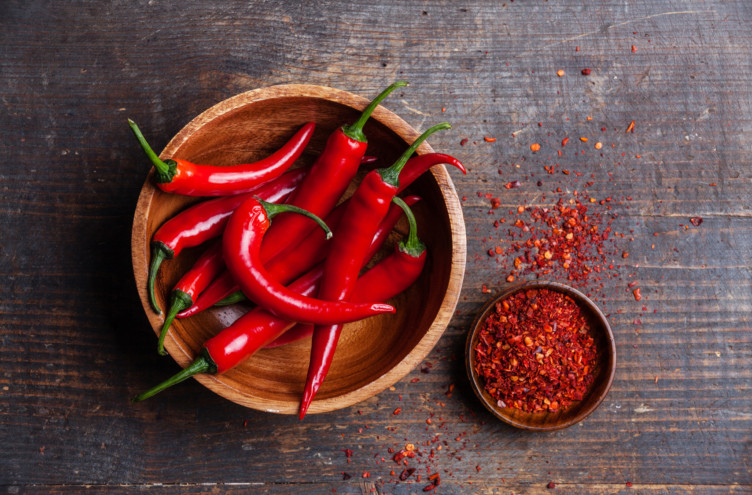5 Reasons to Eat More Hot Peppers

Capsaicin is the molecule that gives jalapenos, habaneros, cayenne, and other spicy peppers their heat. It’s also a culinary oddity – capsaicin is one of the few cooking ingredients that goes beyond the five tastes humans experience (sweet, sour, salty, bitter, and savory). Capsaicin is an irritant, not a flavor – it lights up the pain receptors on your tongue.
Many people enjoy eating spicier foods. That makes humans one of the exceptions in the animal kingdom. Studies show that pigs, dogs, and rats won’t touch spicy food, even when you condition them or give them strong incentives to do so. In humans, though, spice-induced pain leads to increased pleasure, and a more enjoyable meal overall.[1]
Interesting sidenote: most birds are immune to capsaicin. They eat very hot peppers regularly. In fact, many farmers will add peppers to chicken feed to deter hungry scavengers like raccoons. It works out for the peppers, too – the seeds go through undigested, allowing new pepper plants to spread.
Why do you crave what hurts you?
The theory is that the initial pain of eating something spicy makes your brain release endorphins, your body’s natural painkillers. Endorphins bind to opioid receptors (yes, the same receptors that opiates like, well, opium seek out). In other words, that spicy Thai curry gives you a mild high.
But capsaicin’s usefulness goes beyond a simple rush of pleasure. Here are five other benefits to adding more heat to your diet.
#1 Curb aging
A cohort study performed in China from 2004-2008 found that both men and women who ate more spicy food lived longer.[2] Among the study participants, there was a 14% risk reduction in total mortality for those who ate spicy food 6-7 days a week, compared to those who ate spicy food less than once a week. The same study also suggests that spicy food may help fight cancer, heart disease, and respiratory disease.
Correlation doesn’t prove causation – it could be that people who live longer are more attracted to spicy food. But when you consider that capsaicin and other capsinoids in in peppers are exceptionally powerful antioxidants[3][4], the idea that they promote longevity makes sense.
#2 Relieve pain
Ironically, capsaicin can relieve localized pain, including chronic lower back pain and osteoarthritis [5][6], if you rub it directly on your skin. In one study, 60% of participants who used it for lower back pain saw a pain reduction of at least 30%. For osteoarthritis, participants experienced a 53% reduction in pain, compared to 27% reduction from a placebo.[7] It feels great on sore muscles after an intense workout, too.
We still aren’t sure why capsaicin curbs pain. One of the predominant theories is that when capsaicin binds with a pain receptor it triggers release and depletion of substance P, a neurotransmitter that aids in the relay of pain signals to the brain. As substance P diminishes, pain signals to the brain lessen as well.
You can get capsaicin creams and gels online or over-the-counter at a local pharmacy.
#3 For migraines and headaches
Capsaicin may also counter migraines and cluster headaches. People with migraines who took capsaicin intranasally (up their noses) saw a 50-80% improvement in pain.[8] Apparently the burning inside the nose wasn’t that bad and no one dropped from the study because of it.
#4 Boost your cardio
Capsaicin protects your heart by preventing LDL cholesterol oxidation.[9] It also increases blood flow, pushing more oxygen and nutrients through your system.
#5 Burn more fat
Cooking with this kind of heat can help you stay slim, too. Capsaicin is thermogenic – it increases oxygen consumption and boosts your metabolism.[10][11] You’ll burn more fat after a spicy meal.
Downsides to capsaicin?
Chili peppers belong to the nightshade family. Many people are sensitive to nightshades; see how you fare after eating peppers, tomatoes, or eggplant. If you get tired or feel foggy, you may do better without too much of any of the above. Cayenne powder and dried peppers can accumulate mold toxins if they’re stored or dried poorly. Best to get your peppers fresh.
In the mood for something spicy? This Bulletproof Thai curry (recipe at the bottom of the article) is a good place to start.
Sign up for early access to sales, product launches, the latest Bulletproof news and more!



